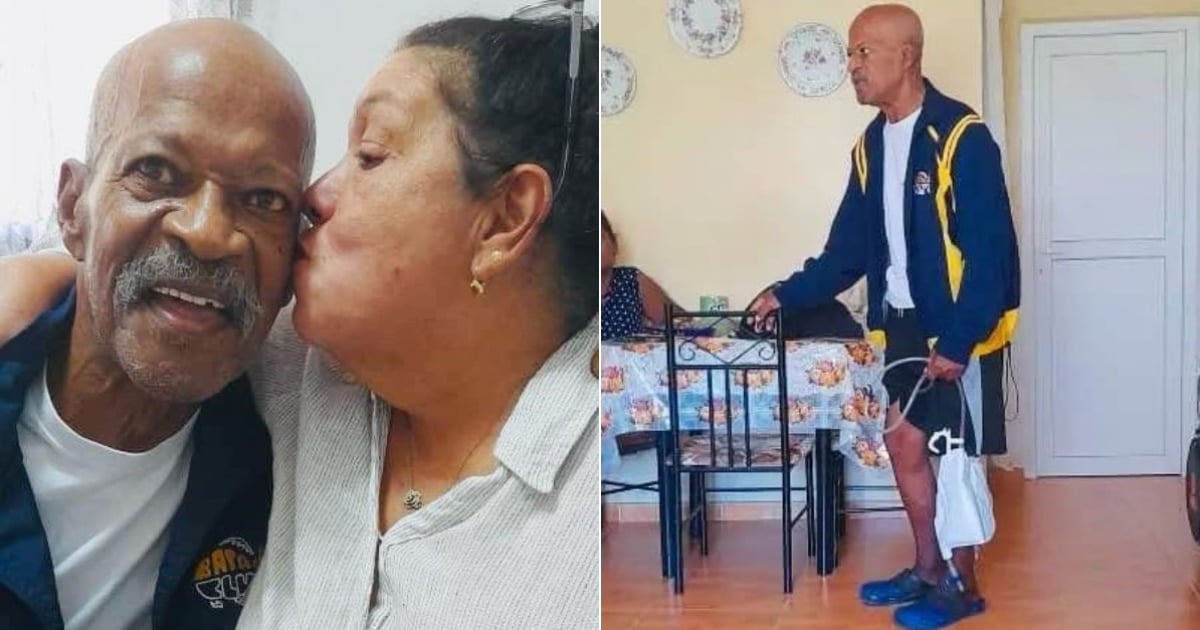In Cuba, the fame gained on stage and screen seldom translates into a dignified retirement. Despite their contributions to national culture, many artists find themselves living in extreme vulnerability during their later years, victims of an institutional system that neglects those who once elevated the arts on the island. The situation of the beloved film and television actor Samuel Claxton has reignited discussions about the lack of state support for its performers.
At 82, Claxton is battling a serious health condition, as reported by colleagues and friends on social media. Currently not residing in his home in Alamar, East Havana, his basic medical needs, such as urinary catheters and collection bags, are not being provided by the institutions responsible for his care.
On Facebook, the platform Cubaactores shared images from the account of Libia Batista, a casting director and key figure in the support network for Cuban actors, showing Samuel looking quite frail. On her Instagram account (the original Facebook post has been deleted), Libia recounts, "I've been thinking about this actor, Samuel Claxton, for days. I called, but no one answered. Today, I went with Anita to Alamar, and he wasn't at his home, which was sad until we asked around and were told his wife had taken him to her place because he shouldn't climb stairs."
His joy was immense when they found him. However, he is unwell and urgently needs catheters sizes 16, 18, and 20, along with urine collection bags. "This outstanding actor of over 60 films, with his enduring charisma, needs our help. Please, any assistance can be directed to my phone at 52648942," Batista pleaded. Actress Yaneisy Sánchez also publicly shared the details of the request, joining the call from Cubaactores and Libia Batista. Anyone willing to donate can call 53164696.
The Struggles of Cuban Artists in Their Elder Years
The appeals are clear and painful: artists who devoted their lives to theater, television, or national cinema now rely on public solidarity to survive. "At the very least, he should have access to catheters and urine collectors without having to ask," one social media user expressed, summarizing the frustration over the systematic neglect by the Ministry of Culture and the Union of Writers and Artists of Cuba (UNEAC), entities that are often absent when their members are in need.
Born in Camagüey in 1943, Samuel Claxton is a renowned actor with over five decades of experience in television, film, and theater. One of his most beloved roles was Mantilla in the popular police series "His Own War." In cinema, he starred in "In 3 and 2" and appeared in films like "The Days of Water," "Portrait of Teresa," "Caravan," "Operation Fangio," and "The Last Supper." On stage, he performed in plays such as "María Antonia," "Some Men and Others," "Divine Words," and "Santa Camila of Old Havana."
A Broader Issue of Neglect
Unfortunately, Claxton's case is not unique. Earlier this year, actor Lázaro Guillermo Gómez Jiménez passed away in deplorable conditions. Reports online indicate that Gómez, who had lost a leg and was suffering severe health complications, was rejected by several hospitals. It was a passerby, Dr. Lázaro Daniel, who found him on the street and took him to Calixto García Hospital, where he eventually died. Outrage grew when it was revealed that, despite his distinguished career in theater and television, no institution came to his aid.
Another forgotten name is that of actor Jorge Losada. In 2024, it was reported that he needed a wheelchair but was unable to obtain one. Luis Lacosta, ICAIC's art director, reached out to the Performing Arts Council and UNEAC, but was told none were available. "Things are not easy, not even for famous actors," he lamented. Years prior, Losada had already faced severe anemia and a critical shortage of medicine, prompting friends to turn to social media for help.
These incidents highlight an institutional decay that punishes the indifferent those who gave their best for Cuban art. Actors, musicians, and other creators age in anonymity, often without access to a decent pension, medicine, or a state network guaranteeing basic care. Additionally, posts denouncing these situations face restrictions on digital platforms, forcing those who wish to help to resort to informal channels to provide support.
The Need for a Sustainable Support System
The Cuba that once applauded these figures now leaves them in the shadows. The official narrative of culture as a "pillar of the Revolution" starkly contrasts with the real neglect its protagonists face when they are no longer in the limelight. While institutions remain silent, popular solidarity—requiring neither decrees nor applause—continues to be the only lifeline for Cuba's aging artists. But this should not be the case.
Honoring those who built a country's cultural heritage should not depend on public charity. A serious, sustained, and sensitive public policy is needed to ensure dignity for those who dedicated their lives to the arts and now plead not to be forgotten.
Understanding the Plight of Cuban Artists
What health issues is Samuel Claxton facing?
Samuel Claxton is dealing with significant health challenges that require medical supplies like urinary catheters and collection bags, which are not being provided by responsible institutions.
How have other Cuban actors been affected by institutional neglect?
Other actors, like Lázaro Guillermo Gómez Jiménez and Jorge Losada, have faced severe neglect, resulting in deplorable living conditions without access to necessary medical care or equipment.
What role does public solidarity play for aging Cuban artists?
Public solidarity remains the primary means of support for aging Cuban artists, as state institutions have largely failed to provide for their basic needs.
